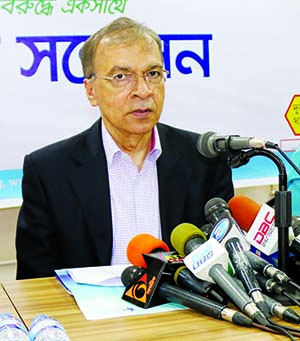
Staff Reporter :
The country has wasted at least 194 hours and 30 minutes, equivalent in estimated value to Tk 163.57 crore, due to the quorum crisis (lack of the presence of the one-fifth MPs) in 23 sessions of the 10th parliament.
The Transparency International Bangladesh (TIB) prepared the report after monitoring the first session of the 10th National Parliament in January 2014 to the last session in October 2018.
“The 10th National Parliament had an average quorum crisis of 28 minutes. There was a quorum crisis of 194 hours and 30 minutes in total in the 23 session of the 10th Parliament,” TIB Executive Director Iftekharuzzaman unveiled the report in a press briefing in the city on Wednesday.
The Constitution asks for the presence of minimum 60 Parliamentarians to fulfil the quorum, or else the session has to be postponed. According to the rules of procedure in the Parliament, the speaker will give directive to ring the bell for five minutes to fulfil the quorum, when needed. If it is not done in five minutes, the Speaker will postpone the session.
The report said that only 12 percent of the total time was spent to pass bills in the 10th Parliament and a total of 193 bills were passed in the last Parliament.
In the House of Lords, 48 percent of the total time was spent to pass bills in the year 2017-2018. In the 16th Lok Sabha in India around 32 percent time was spent to enact bills.
In the 10th session of the Bangladesh National Parliament, around 31-minute time was spent to pass a bill on an average while in India (16th Lok Sabha) it took 141-minute time to pass a bill.
It also reported, 71 percent of the total bills which were passed in the previous parliament took between one to 30 minutes.
The Jatiya Party led by HM Ershad was the Opposition Party in the 10th National Parliament as the BNP boycotted that election demanding a non-partisan caretaker government. The Jatiya Party also remained a part of the government simultaneously amid criticism.
TIB called the Jatiya Party a failed opposition because of its ‘dual role’.
“The 10th National Parliament could not play an active role as expected, because of the absence of a proper opposition,” the TIB Executive Director said.
TIB Executive Director Iftekharuzzaman said that the main opposition Jatiya Party could not play its due role in the last parliament. In the Eighth Parliament, nine percent time was spent to enact bills (2001-2005) while in the Ninth Parliament (2009-2013), this time was eight percent.
“We have never seen the party playing the role of an opposition. They had kind of identity crisis. It was something like they ruined the whole system rather than addressing the problem in it,” he said.

